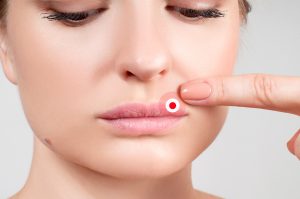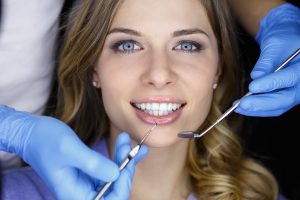 You likely are doing your best to care of your smile to keep it healthy. Brushing and flossing your teeth twice a day, limiting your sugar intake, drinking plenty of water, and visiting your dentist for regular exams are all great ways to care for your smile’s health. Despite even your strongest efforts, you can still find yourself with a cavity in a tooth. Things beyond your control, such as grinding your teeth (bruxism) or misalignment can lead to tooth decay and cavities. A filling can help restore a tooth with a cavity and stop tooth decay from causing more damage. (more…)
You likely are doing your best to care of your smile to keep it healthy. Brushing and flossing your teeth twice a day, limiting your sugar intake, drinking plenty of water, and visiting your dentist for regular exams are all great ways to care for your smile’s health. Despite even your strongest efforts, you can still find yourself with a cavity in a tooth. Things beyond your control, such as grinding your teeth (bruxism) or misalignment can lead to tooth decay and cavities. A filling can help restore a tooth with a cavity and stop tooth decay from causing more damage. (more…)
Can An Implant Support A Dental Bridge?
 Dental bridges are not a new or fresh development in dentistry. Bridges have helped people who have suffered tooth loss to regain confidence and function for their smiles for centuries. Modern dental bridges are made from more lifelike materials like porcelain. They are designed to fit more precisely than ever before with the help of digital technology. One of the most important advantage of today’s bridges over bridges of the past is the addition of dental implants. Dental implants are small titanium posts that act as prosthetic roots of a tooth. Implants can provide improved comfort, appearance, and stability to replacement teeth like crowns, dentures, and dental bridges. A dental implant can support a dental bridge, and it provides many benefits by doing so. (more…)
Dental bridges are not a new or fresh development in dentistry. Bridges have helped people who have suffered tooth loss to regain confidence and function for their smiles for centuries. Modern dental bridges are made from more lifelike materials like porcelain. They are designed to fit more precisely than ever before with the help of digital technology. One of the most important advantage of today’s bridges over bridges of the past is the addition of dental implants. Dental implants are small titanium posts that act as prosthetic roots of a tooth. Implants can provide improved comfort, appearance, and stability to replacement teeth like crowns, dentures, and dental bridges. A dental implant can support a dental bridge, and it provides many benefits by doing so. (more…)
Are There Any Benefits to Cosmetic Tooth Bonding?
 When you need to address one or more concerns with your smile’s appearance, you usually have several cosmetic dental options to choose from. Because all treatments are custom-designed to your specific needs and preferences, the choice often comes down to which one will offer the most immediate and long-term benefits, depending on your unique concerns. Today, we examine a few of the most common benefits of cosmetic tooth bonding, which can help many patients enjoy brighter, more attractive smiles with minimal treatment. (more…)
When you need to address one or more concerns with your smile’s appearance, you usually have several cosmetic dental options to choose from. Because all treatments are custom-designed to your specific needs and preferences, the choice often comes down to which one will offer the most immediate and long-term benefits, depending on your unique concerns. Today, we examine a few of the most common benefits of cosmetic tooth bonding, which can help many patients enjoy brighter, more attractive smiles with minimal treatment. (more…)
Types Of Candy To Avoid This Easter
 The New Year’s Resolutions may begin to fade away as another holiday traditionally adorned with treats comes up. With stores’ aisles full of pastels and brightly-colored candy, it can be easy to find yourself in a sugar overload. When it comes to candy or treats of any kind at any time of the year, moderation is essential. Moderation is all about balancing indulgences with healthy choices. Complete deprivation when it comes to sweets and treats can sometimes lead to a binge. Balance can help lead to overall good choices. Here is a list of some candy to avoid along with some helpful tips on how to replace them. (more…)
The New Year’s Resolutions may begin to fade away as another holiday traditionally adorned with treats comes up. With stores’ aisles full of pastels and brightly-colored candy, it can be easy to find yourself in a sugar overload. When it comes to candy or treats of any kind at any time of the year, moderation is essential. Moderation is all about balancing indulgences with healthy choices. Complete deprivation when it comes to sweets and treats can sometimes lead to a binge. Balance can help lead to overall good choices. Here is a list of some candy to avoid along with some helpful tips on how to replace them. (more…)
How Can My Chipped Tooth Be Repaired?
 A chipped or a cracked tooth, especially in the front of your mouth, can put a chip in your confidence. Depending on the severity of the damage, there are a few different options to repair a chipped tooth. Chips and cracks that only affect the outward appearance of your tooth may be treated differently than damage that also affects a tooth’s function. Restoration is important because a chipped tooth can be left vulnerable to further damage or even to decay. Fixing the damage can help protect the tooth from further damage or decay. Depending on your tooth’s situation, your dentist may restore your tooth with dental bonding, porcelain veneers, or a crown. (more…)
A chipped or a cracked tooth, especially in the front of your mouth, can put a chip in your confidence. Depending on the severity of the damage, there are a few different options to repair a chipped tooth. Chips and cracks that only affect the outward appearance of your tooth may be treated differently than damage that also affects a tooth’s function. Restoration is important because a chipped tooth can be left vulnerable to further damage or even to decay. Fixing the damage can help protect the tooth from further damage or decay. Depending on your tooth’s situation, your dentist may restore your tooth with dental bonding, porcelain veneers, or a crown. (more…)
My Dentist Can Help Me Address Cold Sores?
 It is important to keep your entire mouth looking and feeling healthy, not just your teeth. Many people believe that dentists only deal with teeth, but they care about keeping your lips and gums healthy, too. Cold sores can be painful, itchy, contagious, embarrassing, and irritating to your mouth. They are caused by the herpes simplex virus. While there is not a cure for the virus, the cold sores themselves can be treated. Laser technology can be used by your dentist to stop cold sores before they erupt or to treat them after they do. Laser treatment can help you get rid of cold sores usually faster than topical ointments or creams can. (more…)
It is important to keep your entire mouth looking and feeling healthy, not just your teeth. Many people believe that dentists only deal with teeth, but they care about keeping your lips and gums healthy, too. Cold sores can be painful, itchy, contagious, embarrassing, and irritating to your mouth. They are caused by the herpes simplex virus. While there is not a cure for the virus, the cold sores themselves can be treated. Laser technology can be used by your dentist to stop cold sores before they erupt or to treat them after they do. Laser treatment can help you get rid of cold sores usually faster than topical ointments or creams can. (more…)
What's Causing My Toothache?
 Toothaches are so common that most people will experience at least one throughout their lifetime. Along with the wide variety of people that get toothaches, there also a wide variety of potential causes for a toothache. Each person’s toothache can be vastly different from the next person’s. To give you relief from your aching tooth, your dentist will first have to discover the cause of your toothache. The treatment will depend on whatever is causing the pain, as different causes have different treatments. (more…)
Toothaches are so common that most people will experience at least one throughout their lifetime. Along with the wide variety of people that get toothaches, there also a wide variety of potential causes for a toothache. Each person’s toothache can be vastly different from the next person’s. To give you relief from your aching tooth, your dentist will first have to discover the cause of your toothache. The treatment will depend on whatever is causing the pain, as different causes have different treatments. (more…)
Different Types Of Tooth Discoloration
 There are two different ways that teeth can be discolored. Dull, yellow teeth can make you feel insecure about showing off your smile. Refreshing and whitening your smile can be a fairly quick and simple way to boost your confidence in your appearance. Understanding that there are two different types of tooth discoloration can help you know the difference between how you brighten your smile. Your dentist can help you to both understand the types of stains on your teeth and help you find the best ways to deal with it. (more…)
There are two different ways that teeth can be discolored. Dull, yellow teeth can make you feel insecure about showing off your smile. Refreshing and whitening your smile can be a fairly quick and simple way to boost your confidence in your appearance. Understanding that there are two different types of tooth discoloration can help you know the difference between how you brighten your smile. Your dentist can help you to both understand the types of stains on your teeth and help you find the best ways to deal with it. (more…)
Do You Have Chronic Bad Breath?
 Everyone deals with bad breath at some point in their lives. Many people experience morning breath, while some people experience chronic bad breath that doesn’t go away easily. While bad breath can be bothersome just on its own, not being able to get rid of it can make the situation much more stressful. Usually, dealing with chronic bad breath may be a possibility with help from your dentist. If you have chronic bad breath, knowing the causes, both obvious and less obvious, can be helpful in solving the problem. (more…)
Everyone deals with bad breath at some point in their lives. Many people experience morning breath, while some people experience chronic bad breath that doesn’t go away easily. While bad breath can be bothersome just on its own, not being able to get rid of it can make the situation much more stressful. Usually, dealing with chronic bad breath may be a possibility with help from your dentist. If you have chronic bad breath, knowing the causes, both obvious and less obvious, can be helpful in solving the problem. (more…)
Am I Too Old To Straighten My Smile?
 Many adults with a crooked smile find themselves asking, “am I too old to straighten my smile?.” Movies and television have filled our heads with the images of teenagers wearing braces and headgear, which makes many of us mistakenly believe that straightening our smiles is strictly for adolescents. While Invisalign treatment is appropriate for kids and teens, it is also appropriate for adults. Misaligned smiles and crooked teeth can be problematic for anyone of any age. (more…)
Many adults with a crooked smile find themselves asking, “am I too old to straighten my smile?.” Movies and television have filled our heads with the images of teenagers wearing braces and headgear, which makes many of us mistakenly believe that straightening our smiles is strictly for adolescents. While Invisalign treatment is appropriate for kids and teens, it is also appropriate for adults. Misaligned smiles and crooked teeth can be problematic for anyone of any age. (more…)







